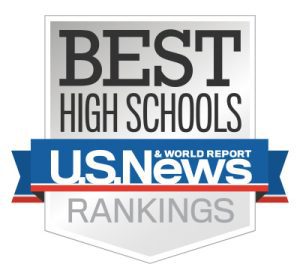 After dropping several spots in the rankings, Columbia University made national news when it announced in June that it will no longer share data with U.S. News and World Report for its Best Colleges guide. Columbia, like Yale Law School and others that have stopped cooperating in their guides, have argued the rankings were having too much influence (2024’s comes out next week) and not putting enough weight on the right things. Though college and graduate school rankings do strongly influence one’s decision to apply to and attend a school, what are U.S. News Best High Schools rankings intended for? Princeton High School (PHS), which was once ranked the 94th Best U.S. High School back in 2009 dropped to #534 in the latest rankings that came out this August. It has been in a steady decline in these rankings, with one exception, since at least 2017.
After dropping several spots in the rankings, Columbia University made national news when it announced in June that it will no longer share data with U.S. News and World Report for its Best Colleges guide. Columbia, like Yale Law School and others that have stopped cooperating in their guides, have argued the rankings were having too much influence (2024’s comes out next week) and not putting enough weight on the right things. Though college and graduate school rankings do strongly influence one’s decision to apply to and attend a school, what are U.S. News Best High Schools rankings intended for? Princeton High School (PHS), which was once ranked the 94th Best U.S. High School back in 2009 dropped to #534 in the latest rankings that came out this August. It has been in a steady decline in these rankings, with one exception, since at least 2017.
For colleges, U.S. News and World Report changed its methodology in May, in reaction to some of the criticism. This included gathering data not just from the colleges directly but from public resources as well. For high schools, all data used to determine the rankings is from 3rd parties, such as a U.S. Department of Education website, which updates basic demographic and enrollment data annually. It also utilizes state standardized assessment data and information from College Board and International Baccalaureate. Does this make the high school rankings more accurate? More importantly, do the people of Princeton or those considering moving here really care?
THE PEOPLE’S PERSPECTIVES
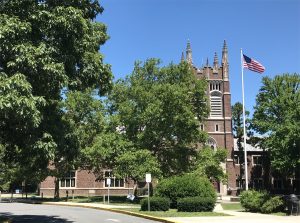 “It’s not what the school system is worth, it’s what you do with the school system that makes you worth something,” states Martin Bendersky. He has lived in Princeton for 32 years but raised his daughter, who has found professional success, through the nearby Lawrence school system.
“It’s not what the school system is worth, it’s what you do with the school system that makes you worth something,” states Martin Bendersky. He has lived in Princeton for 32 years but raised his daughter, who has found professional success, through the nearby Lawrence school system.
Bendersky says he does not really care about his home value, as he intends to live the rest of his years there, and he generally finds rankings to be “just a number.” A local mother with children at Community Park School feels similarly, citing concern that a focus on the rankings just puts more pressure on kids.
“I didn’t look at the rankings when moving here. Schools are based on zip codes so I knew, in this affluent area, the schools would be good, or be good enough.”
Is good enough, OK? Not for everyone that’s chosen to move here. Local Facebook groups include numerous concerned comments from parents worried about their home values and the quality of education for their children. One such parent, Christine Ritchie, who has 9th and 11thgraders at PHS (with a 6thgrader in Cranbury) moved to the area for Princeton High School in 2021 and is alarmed about the already decreased rankings since she arrived.
“It does tell a story and especially a trending story. I don’t think you can completely reengineer your district or change how you’re governing to focus on the rankings, but I believe they do show a trend. The fact the rankings in Princeton have gone down – and not just 1 or 2 but 10, 50, 100 a year – is pretty material,” says Ritchie. “We looked at Hopewell, but when we compared the rankings, it didn’t look like the right district for us, the rankings weren’t good enough. That’s where we made a deliberate choice. We wanted to be in Princeton, but couldn’t find anything, so we’re in Cranbury. But we were focused on Princeton because of the rankings and all the things we read about the district. If I knew everything about Princeton I know now, I wouldn’t have been so focused on buying here.”
Another parent, father of 3 daughters with the oldest in 4th grade at Princeton Charter School, does not intend to send his girls to Princeton High School due to the latest statistics and happenings. “At the high school, rankings definitely matter,” he concludes. “I’m from the Trenton school system, so this is an upgrade. But I worry, I don’t know how to fix it.”
MORE TO THE STORY
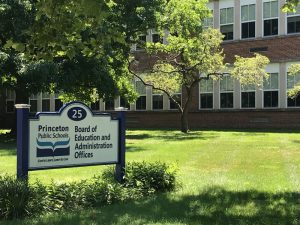 If looking just across NJ, PHS is ranked 26th in the U.S. News guide, with local schools West-Windsor Plainsboro (WW-P) High Schools North and South coming in above (at 17 and 20, respectively). According to the 2023 Niche Best Schools Report (which came out Sept. 2022), another resource that profiles and ranks schools across the U.S., PHS is the 12th Best High School in NJ, above both WW-P schools. It is important to note that as an overall district, Princeton Public Schools rank even higher on Niche, as the #3 Best School District in New Jersey.
If looking just across NJ, PHS is ranked 26th in the U.S. News guide, with local schools West-Windsor Plainsboro (WW-P) High Schools North and South coming in above (at 17 and 20, respectively). According to the 2023 Niche Best Schools Report (which came out Sept. 2022), another resource that profiles and ranks schools across the U.S., PHS is the 12th Best High School in NJ, above both WW-P schools. It is important to note that as an overall district, Princeton Public Schools rank even higher on Niche, as the #3 Best School District in New Jersey.
“Niche named Princeton High School the top high school in Mercer County [of which there are 10 traditional public high schools] and the top non-magnet (open admissions) high school in the state,” responds Princeton Public Schools Board of Education President Dafna Kendal. With regards to the U.S. News guide, she adds, “There are so many reasons for the changes. One of the biggest reasons being that there are so many more charter/magnet schools than in 2009. 40% of the score has nothing to do with state assessments, which aren’t comparable across the country, and the overall subjectiveness of the rankings in general. We offer rigorous classes in all subject areas, 31 AP classes, independent studies, a world class fine arts program, all while serving students of a diverse student body.”
PHS has long been known for its rigor and variety of offerings, so that likely hasn’t changed too much. But the school did have 7.5% more students last year than it did in 2009. The diversity of Princeton’s schools, where 9% are described in the U.S. News guide as economically disadvantaged, came up with several of the residents we spoke to as well. Some wondered whether that factors in a positive or negative way. U.S. News worked with a research firm to score the schools, citing its methodology does factor in diversity and much more.
THE U.S. NEWS METHODOLOGY
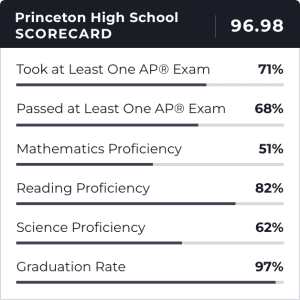
“A great high school educates all students from different social and economic backgrounds, exposing them to challenging coursework on the path to graduation. The highest ranked U.S. public schools in U.S. News & World Report’s 2023-2024 Best High Schools rankings are those whose students demonstrated outstanding outcomes above expectations in math, reading and science state assessments, earned qualifying scores in an array of college-level exams, and graduated in high proportions,” the website explains.
The guide cites six ranking indicators used to score the schools:
- College Readiness Index (CRI), based on the proportion of 12th grade students who took and earned a qualifying score on at least one Advanced Placement or International Baccalaureate exam (30% of ranking)
- State assessment proficiency, based on aggregated scores on state assessments that students may be required to pass for graduation (20%)
- State assessment performance, based on whether performance on state assessments exceeded expectations given the school’s proportion of underserved students (20%)
- Underserved student performance, based on how Black, Hispanic and low-income students performed on state assessments compared with those who are not underserved in the state (10%)
- College curriculum breadth, based on proportions of 12th grade students who took and earned a qualifying score on AP and/or IB exams in multiple content areas (10%)
- Graduation rate, based on the proportion of students who entered ninth grade in 2017-2018 and graduated four years later (10%)
OTHER FACTORS TO CONSIDER
Prior to 2019, U.S. News solely relied on the CRI. That year, it reformulated to include the six factors above. The outlet also clarifies that while the details and weight of each of the six measuring tools remains the same since 2019, the pandemic caused a shift in how three of them are calculated. Does this explain the 440-spot drop from 2009?
“Because U.S. News & World Report completely revamped its methodology in 2019, rankings from earlier editions are not comparable to those from 2019, 2020, 2021, 2022 and 2023-2024,” explains Dr. Carol Kelley, superintendent of Princeton Public School District. In 2019, PHS was #332, down to #356 in 2020, to #703 in 2021, #490 last year, and #534 for 2023. “While many people rely on published high school rankings, it is not a full measure of our success. Criteria varies for each publication making the lists somewhat subjective. Rather, it is our rigorous and innovative programming, our dedicated staff, and the high-quality educational experiences we provide to students that continues to keep Princeton High School competitive as compared to other high schools in New Jersey and across the nation.”
Everyone we spoke to does agree, high school rankings are only one barometer in determining the quality of a school. One resident, who has lived in Princeton for 62 years, said she thinks Princeton teenagers these days are rude and not well-spoken, so she wasn’t surprised to learn of a drop, but she also blames the deterioration on parents.
For others, while weighing the rankings against reputation, first-hand experiences and future success are valuable, there is still concern about what a large drop in ranking might signify.
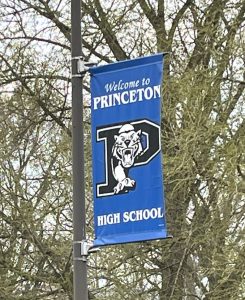 “These rankings seem to be against the reputation of power schools. I’m very surprised,” SherAli Tareen adds. He has lived here with his family for 5 years and plans to send his 3-year-old to Princeton’s public schools beginning next year. “It’s all about the methodology of the rankings, but this seems like a large shift. It’s going to have an impact on what college you go to, and that affects the rest of your life.”
“These rankings seem to be against the reputation of power schools. I’m very surprised,” SherAli Tareen adds. He has lived here with his family for 5 years and plans to send his 3-year-old to Princeton’s public schools beginning next year. “It’s all about the methodology of the rankings, but this seems like a large shift. It’s going to have an impact on what college you go to, and that affects the rest of your life.”
The Niche Best High School rankings for 2024 are due out later this month. We’ll let you know if those show any trends. There are a lot of eyes focused on what will happen at Princeton High School, since the removal of Frank Chmiel as principal last year and numerous concerns that were raised by parents. School opened last week with a new principal, Dr. Cecilia Birge, at the helm. Will this lead to any changes, perhaps higher rankings? Time will tell.

Lisa Jacknow spent years working in national and local news in and around New York City before moving to Princeton. Working as both a TV producer and news reporter, Lisa came to this area to focus on the local news of Mercer County at WZBN-TV. In recent years, she got immersed in the Princeton community by serving leadership roles at local schools in addition to volunteering for other local non-profits. In her free time, Lisa loves to spend time with her family, play tennis, sing and play the piano. A graduate of the S. I. Newhouse School of Public Communications at Syracuse University, Lisa was raised just north of Boston, Massachusetts but has lived in the tri-state area since college. She is excited to be Editor and head writer for Princeton Perspectives!
